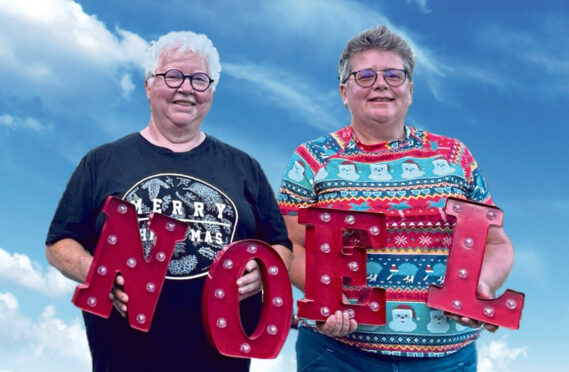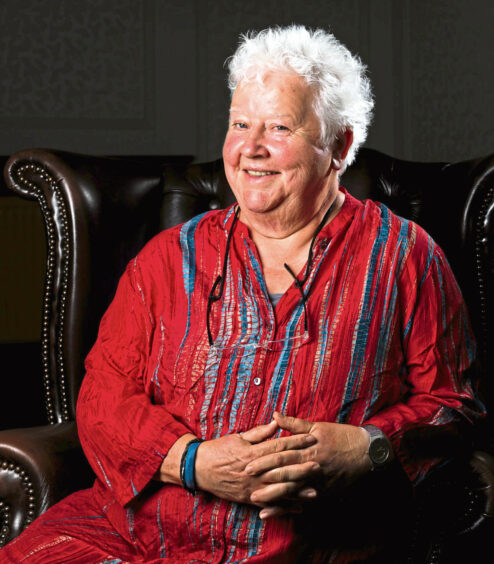
’Tis the season of peace and joy, of goodwill to all…or is it? Certainly, Val McDermid fears the festivities are just as likely to generate felony most foul.
The best-selling novelist so firmly believes Christmas can literally be murder, she used it as the title for her collection of seasonal short stories, and says the reason why we are drawn to the dark side despite the glare of fairy lights is obvious.
“At Christmas we spend time with our families, but we don’t always love everyone in our family as much as we might. Sometimes crime fiction acts as a safety valve. If you read about it, it prevents you from doing it,” she laughs.
“In Norway they have a tradition at Easter that everyone goes off to their place in the country and families have a big get-together rammed into these wee but’n’bens up in the fjords. They always take crime novels with them. You sit there and read your thriller and you’re not tempted to put an axe in Uncle Axel’s head.
“The other side of it is that you’re having some time off work, having fun with friends and family and it’s a safe time to read crime fiction because you’re with people who love you.”
“I have a nasty, devious twisted mind,” she says. “I make great use of the two words ‘what if?’ I eavesdrop, I spy on people on the bus or on the train or at the supermarket and I watch their behaviour and listen to them talking, and weld that on to little things I hear on the radio or read in the papers or a throwaway sentence on the TV.
“I take the world around me and play with it. I don’t find it difficult to come up with my stories. The difficulty is in trying to develop them into a full-blown plot with the twists and turns you need to incorporate.”
The new paperback edition of Christmas Is Murder might be filling stockings in Scotland but McDermid is enjoying Christmas poolside on the other side of the world, in sun-soaked New Zealand with her wife, Jo Sharp, Scotland’s Geographer Royal.
The novelist and her partner, a professor at St Andrews University, were in the country’s chill South Island where McDermid is professor of Scottish studies and crime fiction at the University of Otago but are enjoying the sunshine and beaches of the warmer North Island when The Sunday Post catches up with them.
Zooming in from Tauranga, McDermid, 67, who plans to be home in Scotland for Hogmanay, says: “It is my first Southern Hemisphere Christmas, so we will be spending Christmas by the pool. We’re house sitting for a friend who has gone back to the UK for Christmas and fortunately for us has a pool and a spa.”
The couple, who swapped the altar for an Edinburgh whisky bar when they got married, in a ceremony attended by guests including First Minister Nicola Sturgeon and Harry Potter author JK Rowling, arrived in the Southern Hemisphere in time to celebrate their sixth anniversary in October. It’s a date they share with fellow crime novelist Craig Robertson and his wife Alice Sokoloff, who also happened to be in the country.
“We had a joint celebration; there might have been a few drams,” she says, before admitting: “It has been good for my state of mind not to be in the UK. There was a period back in October when you’d wake up every morning and wonder, ‘who is the government today?’ And, why are we so docile? If it were France people would be taking to the streets and taking on the government.”
But, along with geographical distance, McDermid, whose books inspired TV dramas Karen Pirie and Wire In The Blood, has been cheered by the success of her son Cameron, 21.
McDermid, the working-class Kirkcaldy girl who became the first student from a Scottish state school to graduate from St Hilda’s College Oxford, later going on to become an Honorary Fellow, says: “Cameron has just graduated from York University with a first class degree in politics and philosophy. He did better than me. I am very proud of him. He has been an easy kid to raise and has never once slammed a door on me,” she says, smiling.
Remembering Christmases with him growing up, she says: “I had a house in Northumberland and Cameron came along with his cousins and their mums for a family Christmas.
“The best part was the elaborate stockings I would make up, full of wee toys, surprises and magic tricks. That always took up a big chunk of time, and then we would all go for a walk on Alnmouth Beach before coming back to have our Christmas dinner. It always felt like a very relaxed and loving time.”
But not all were happy. “The very first Christmas I can remember was a sad one,” she reveals. “I must have been two and a half at the time. We lived in Kirkcaldy and the town square was the centre of festivities, with a big tree and a post box where you could post presents for little ones in the children’s home.
“The centrepieces were two machines about the size of a table football game. You’d put two pennies in and a pipe band and plastic soldiers marched up and down to the sound of Scotland The Brave. I still have an image of it in my head.
“I remember being there, sitting up on my dad’s shoulders, watching the Christmas festivities and saying to my dad that I wished ‘Pop’, my grandad, was here. He was my father’s father and a miner who had died a few months before from a mining-related lung disease.
“When I was wee, Christmas Day was not a bank holiday in Scotland. My dad would get a half day and Christmas would start when he came in from his work. Then we could open the presents and have Christmas dinner. On Christmas morning, there was a certain amount of sitting about, chewing your fingernails and feeling the parcels, wondering what might be in them.”
Now working on her 38th novel, McDermid – who has sold 17 million copies worldwide of her books, which have been translated into 40 languages, with a second round of her most recent TV series Traces now in production, along with ITV’s adaptation of Karen Pirie – admits she is in perpetual motion and constant wonder.
“I couldn’t have written the plot of my own life,” she admits. “I started off a working-class lass in Kirkcaldy and did not expect to be living the life I am; hanging about with all sort of interesting people. Someone sent me a photograph today of an advert on one of the boulevards in Los Angeles, and there’s Karen Pirie, it’s mad. I don’t know how that happened. I just put words on a screen.”
When back from New Zealand, McDermid divides her time between her homes in Edinburgh and St Monans. And, after Christmas, the crime writer will be seeing the New Year in at St Monans, sitting round a fire pit with her wife and neighbours, enjoying a dram and watching the fireworks across the Forth.
Any regrets looking back on life so far? “My dad died when I was 32, the week before my first book came out. So he never actually held it in his hand, though he knew it was coming. He’d have been a great grandad. I would have liked to have more time with him.”
And admitting to falling foul of “imposter syndrome” in the past, she says: “I’d like to show off to the teenage me, on her way to St Hilda’s, and tell her, one day they’ll make you an honorary fellow of this college.
“If I told her they’d make successful TV series of her books she’d just think I was making it up. Stuff like that doesn’t happen to people like us.”
And what of hopes for the future? “My intention is to carry on writing for as long as I am capable. If I start writing books that are not up to scratch I hope my team will tell me, so I can make a graceful exit.
“My role models in this respect are PD James (Phyllis Dorothy James White) and Ruth Rendell. Phyllis died when she was 93 and she was writing right up to the end. I did an event with her in the summer before she died.
“We were sitting in the green room afterwards having a wee drink and I said: ‘And you’re writing aren’t you, Phyllis?’ She said she was but it wasn’t a Dalgleish mystery. When I asked why she said, ‘I don’t want to die in the middle of it and have one of you lot finish it off.’
“When Ruth Rendell had a stroke that ultimately led to her death, in her handbag was a memory stick with the manuscript of her final novel. That’s the way to go.”

Enjoy the convenience of having The Sunday Post delivered as a digital ePaper straight to your smartphone, tablet or computer.
Subscribe for only £5.49 a month and enjoy all the benefits of the printed paper as a digital replica.
Subscribe © David Empson/REX/Shutterstock
© David Empson/REX/Shutterstock